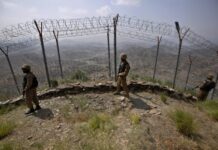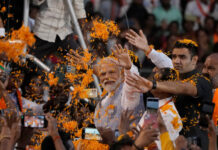Ayesha Malik
If you are a Kashmiri in a Bollywood film, chances are high that you will be represented in one of the two ways; if you are a man, as a kohl-eyed militant muttering darkly your plots of revenge against hapless Indian soldiers; if you are a woman, as a victim to the former’s brutality waiting to be saved by the latter’s more enlightened values. Some might rightly ask, who cares about Bollywood? In the hierarchy of what Kashmiris need for their cause, surely adequate representation in films should be shelved at the very bottom. Unfortunately though, media and culture have a very powerful influence on society, and, as the American scholar Joseph Nye says apropos of the information age, “the mark of a great power is not just whose army wins, but also whose story wins.”
And Bollywood’s storytelling is one of the most devoured cultural products in South Asia and abroad. Not only does it allow for the cultivation of a national identity, it also allows for a rally around the flag effect in ensuring collective solidarity. As the epithet goes, we are what we consume and the spectator class in this digital age makes for passive recipients of whatever ideology the culture is selling. Films are an important part of this culture and a fitting tool for soft power. As an art form, we can consume them quickly and easily, with little to do except sit there and imbibe whatever is on screen. They can also construct reality, rather than merely reflecting it. That is why they are so good at creating and energizing mass political movements. Certainly, with India trying to create specific, distorted images about Kashmir and Kashmiris, understanding this phenomenon becomes all the more important. Here, it is essential to note that India is neither the first nor the only one doing this.
Israel is one country which has really leveraged the power of films to its benefit. After it was established in 1948, private investors began to finance films as early as the 1950s, which largely sought to construct a collective consciousness justifying the state’s existence. Exodus (1960), based on a book by Leon Uris, showed the founding of Israel from a pro-Zionist perspective. It boasted an impressive Hollywood A-list cast and was said to contribute significantly to “building the understanding of Middle Eastern politics by a generation of young Jews”. David Ben-Gurion, Israel’s first Prime Minister, said about the book, “as a literary work it isn’t much, but as a piece of propaganda, it’s the best thing ever written about Israel.”
Likewise, Indian films on Kashmir and Pakistan are wielded to spread India’s political narrative about itself. In this narrative, India is a country of yoga, Bollywood, and Gandhi and not one which has brutally occupied and slaughtered Kashmiris for nearly eight decades. One of Bollywood’s latest offerings which focuses on Kashmir is the film Pathan (2023) starring Shah Rukh Khan, a Bollywood superstar who constantly has to prove his Muslimness. The plot, in a nutshell, goes something like this: India abrogates Article 370; Pakistan is unhappy and the Inter Services Intelligence’s revenge is to unleash smallpox in India, Deepika Padukone is an ISI agent who turns against Pakistan after being aghast that her country could be so diabolical, and SRK manages to save India from smallpox and gets a promotion at the Research and Analysis Wing (R& AW) for his efforts. The ‘good’ Muslim in Indian cinema is the one who manages to override his Muslimness to fight Pakistan and the ‘good’ Pakistani is she who realizes that her country is on the wrong side and betrays it. It is frankly Bollywood at its worst and yet it became the highest-grossing Hindi film of all time in India and the world over.
India’s high-handedness over its propaganda attempts on Kashmir has not always been so successful. However, even where it fails, the extent to which it has sought to wangle facts to suit its ends is alarming. The Kashmir Files (2022), for instance, seems to singularly try to convert Kashmir’s history into a Hindu one. The film is about the exodus of the Kashmiri Pandits during the 1990s insurgency and has been heavily criticized for presenting ahistorical facts as real. The plot is explained as “a young Kashmiri Pandit student of JNU who is brainwashed by his scheming female professor into believing that all Kashmiris deserve justice and Kashmiri Muslims have suffered too…The young Kashmiri Pandit student gradually overcomes his progressive mental conditioning to realise the great ancient Hindu glory of Kashmir and of Kashmiri Pandits.” The brainwashing complained about is itself another type of brainwashing. Even an Israeli filmmaker, who was the head juror of a government organised film festival, criticized it for being “vulgar and propaganda.”
So how do we counter this? After all, states seeking to promote their own ideologies through the exportation of culture is hardly a new thing. Arts have long been a playing field for power struggles and narrative-building, something which positions them as keys planks of diplomacy. The rise of China has even seen Hollywood producers kowtow to their profit margins. Four extra minutes of footage was added to Ironman (2013), which showed the product placement of Chinese brands, additional nameless assistant roles being given to popular Chinese actresses as well as shots of cheering Chinese schoolchildren. Metro-Goldwyn-Mayer (MGM) has even adopted a self-censorship policy which went so far as to alter the footage shot in the film Red Dawn (1984), to change its ‘Chinese’ invaders into North Koreans. Chinese influence ensures that it will no longer be the nameless, faceless villain in action movies.
Pakistan has, so far, done little but object to India’s attempts to soldier the narrative on Kashmir through its films. While we have banned Indian movies in our cinemas (a good move which should not be rethought), we have done little by way of making counterculture attempts. A Pakistani filmmaker, Shehzad Hameed Ahmad, made an award-winning documentary titled India’s Saffron Brigade in 2022 which highlighted the Islamophobia of India’s right-wing groups. It barely made headlines in Pakistan. The only Bollywood film which seems to buck the pro-Hindutva/anti-Pakistan trend is Haider (2014), which is based on Basharat Peer’s memoir Curfewed Night, a Kashmiri recollection of the 1990s and a film whose release would be unthinkable in Modi’s India. There are gifted Kashmiri writers who can tell their own stories and, while they may not all be pro-Pakistan, if the Pakistani state wants to keep propping up a counter narrative to India’s, their writings could be used.
Unfortunately, Lollywood and government-funded movies do not do a good job in their attempts to counter the culture of anti-Pakistani movies from across the border. They are often too on the nose due to the close involvement of the state, lack the slickness of Bollywood movies, and include far too many meme-able scenes to be considered solid counterculture attempts to thwart India’s mendacious propaganda. Funds and focus are needed to incentivize budding Kashmiri filmmakers to make their own films and tell their own stories of life under occupation.
Pakistan can and should play a role in facilitating all this. Investments should be made in screening documentaries which expose India’s Hindutva regime, funding films which show the occupation from a Kashmiri perspective, and hosting art exhibitions from Kashmiri artists showcasing their lives under Indian state terrorism. It also needs to work with Kashmiris to invest in preserving their culture. As India readies itself for a rebrand to ‘Bharat’ and plans to host Miss World in Kashmir, the Kashmiriness and Muslimness of the Valley are fast-eroding. This goes in tandem with its illegal attempts to erode Kashmir’s culture by transferring non-locals, mainly Hindus, to the territory and adding Hindi as one of the official languages of the state, altering its demographic and linguistic landscapes irrevocably.
In an interview, the director of the Kashmir Files apparently said, “[w]ho says facts are facts? Aap apne facts apne paas rakhiye. Mujhe jo karna hai main karoonga (Keep your facts to yourself; I’ll do whatever I wish to).” For this filmmaker, facts are merely plot points which can be contrived to echo your interests. To go back to Nye, it is all about whose story wins. While the facts might be on our side, it seems we have not yet done enough to tell our story.
Ayesha Malik is Deputy Director, Research Society of International Law and Team Lead for the Conflict Law Centre.

















